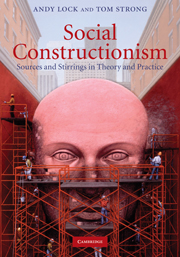Book contents
- Frontmatter
- Contents
- Preface
- Acknowledgements
- 1 Introduction
- 2 Giambattista Vico
- 3 Phenomenology
- 4 Hermeneutics
- 5 Marxism and language
- 6 Lev Vygotsky
- 7 Meanings and perspectives
- 8 Ludwig Wittgenstein
- 9 Gregory Bateson
- 10 Sociologies – Micro and Macro
- 11 Sources of the self
- 12 Michel Foucault and his challenges
- 13 Discourse analysis
- 14 Ken and Mary Gergen
- 15 Rom Harré
- 16 John Shotter
- 17 Concluding remarks
- Bibliography
- Index
16 - John Shotter
Published online by Cambridge University Press: 05 June 2012
- Frontmatter
- Contents
- Preface
- Acknowledgements
- 1 Introduction
- 2 Giambattista Vico
- 3 Phenomenology
- 4 Hermeneutics
- 5 Marxism and language
- 6 Lev Vygotsky
- 7 Meanings and perspectives
- 8 Ludwig Wittgenstein
- 9 Gregory Bateson
- 10 Sociologies – Micro and Macro
- 11 Sources of the self
- 12 Michel Foucault and his challenges
- 13 Discourse analysis
- 14 Ken and Mary Gergen
- 15 Rom Harré
- 16 John Shotter
- 17 Concluding remarks
- Bibliography
- Index
Summary
It's like I was playing some kind of game, but the rules don't make any sense to me. They're being made up by all the wrong people. I mean no one makes them up. They seem to make themselves up.
(Benjamin, in The Graduate, 1967)When will John Shotter stop playing with his self?
(Graffiti, Department of Psychology, Nottingham University, 1976)The answer to this question turns out to be ‘never’. John Shotter's work has a continuously developing character in which themes and sources are revisited as each little reworking of them enables him to discover a richer set of insights and syntheses around the central question: ‘what is it to be human?’ He has been, along with his frequent collaborator Ken Gergen (see Chapter 14), a central figure in the elaboration and legitimation of the approach in contemporary psychology termed ‘social construction’. His work draws from the sources and stirrings that we have been outlining during this book, and casts a penetrating light that brings out their relevance for understanding what humans are about, and what the character of our lives is. We predict you will experience an ‘Aha!’ feeling time and again as you begin to read of his work here: ‘Aha! so that's what all this stuff is about.’ This is one of the reasons why his work has become of increasing interest to contemporary discursive therapists.
- Type
- Chapter
- Information
- Social ConstructionismSources and Stirrings in Theory and Practice, pp. 324 - 342Publisher: Cambridge University PressPrint publication year: 2010



